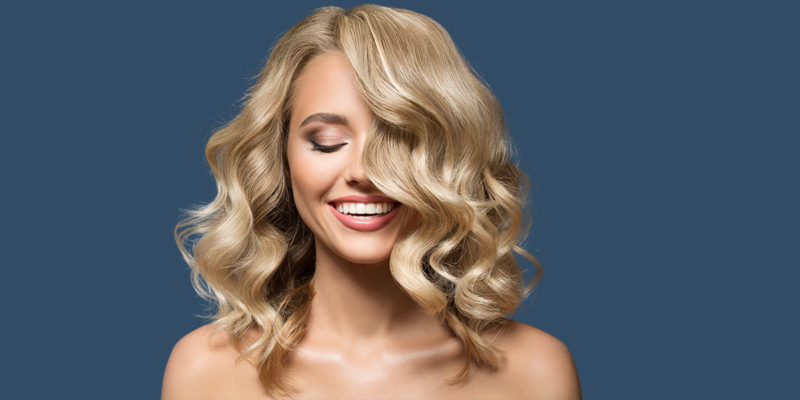Hard Water: What the Heck is this Gray Gunk in My Hair?

You just moved from one state to another, or maybe even just across town. You take a shower, wash your hair as usual with the same shampoo and conditioner you’ve always used, and wait for it to dry.
Then you go to comb it—and your comb gets stuck.
When you manage to get the comb far enough down that you can see what’s going on, you notice your hair is knotted around something that looks like slimy gray lint.
Disgusting, right?
You manage to get it all out of your hair, only to find it accumulates again the next day when you take another shower.
How Do You Know If Your Hair Is Healthy? Take The Hair Quiz and Find Out Now!
Washing your hair just seems to make it dirty. Ugh, what is going on here?
Nope, it’s not your shampoo or conditioner, and it probably isn’t any other hair care product you’re using either.
And it definitely isn’t you. If the above situation sounds familiar to you, you probably are dealing with hard water!
First, let’s learn a little more about hard water and what’s going on here. Then we’ll go over some simple solutions to get your hair back to being soft, shiny and gunk-free!
What is Hard Water?
Water falling from the sky as rain is “soft” water. It is coming straight out of the clouds, and has no minerals in it. As it passes into the ground and turns into groundwater, however, it starts accumulating minerals from the soil. At this point, it becomes “hard” water.
Hard water is high in mineral salts like calcium and magnesium ions (it is these ions which pose the problems you are having in the shower).
The hardness is measured in grains per gallon, which then is translated into a rating from 1-10, with 10 being the hardest water.
When you turn on your shower, you heat the water, which causes the minerals to precipitate out of it.
The resulting deposits manifest in your kitchen or bathroom as soap scum when they become mixed in with the detergents that you use. Those same mineral deposits build up as gunk in your hair when you wash it.
To add to the problem, you can get a similar effect to soap scum resulting from the buildup of excess filmy shampoo. This takes the sheen out of your hair and makes it look dull. It may also lose body and become limp.
Bonus: Download these 10 Aloe Vera Hair Gel Recipes for longer, stronger and healthier hair you'll fall in love with.
If you are curious about the health effects of hard water, you have nothing to worry about. If you have hard water in your house, it is inconvenient, but not unhealthy.
Calcium carbonate in hard water can actually reduce your chances of developing osteoporosis if your diet is also high in vitamin D.
Hard water minerals may also help to protect your cardiovascular health. So at least there is some consolation to be had if you must cope with the woes of hard water in your shower!
Do You Have Hard Water?

The evidence is in your hair.
Mineral deposits from hard water usually form little knots of sticky gray gunk. Watch out for hard-to-reach areas underneath your hair where it’s tough to get a comb through.
Leave these patches go for even a few days and your hair will start matting. Once it does that, it is really tough to get it to un-mat. It also does not dry as thoroughly, which adds to the problem.
The evidence is in your comb or hairbrush.
If the prongs on your comb or hairbrush are covered in gray stuff that is really hard to scrape off, you probably have hard water.
You can literally feel the difference in the shower.
Soft water feels “slippery” compared to hard water.
To some people the difference is almost feels like the water is slimy. Why does this happen?
Your soap actually lathers better in soft water than in hard water, so this can make you feel slippery in the shower. It can also make the soap and shampoo harder to wash away.
Soft water also contains sodium or potassium ions which makes it harder for the water to stick to the soap. This in turn makes it harder for the water to wash away the soap.
You can also check your location on this map provided by the USGS, which shows the concentration of calcium carbonate in milligrams per liter.
The higher the concentration, the harder the water.
As you can see, the hardest water is right in the middle of the country in states like Texas, Arizona, Kansas, New Mexico and Southern California. The “softest” water is found on the East Coast as well as parts of the Pacific Northwest.
This quick video by GE talks about soap scum and other evidence elsewhere in your household which may indicate you have hard water.
This video also mentions water softening appliances (as it is essentially an advertisement for GE), which I’ll talk about in a bit. Don’t get too excited about them; they are very expensive.
Is Soft Water Really “Soft?”
Don’t assume just because you live in a “soft water” area that you aren’t going to be dealing with hard water chemicals.
Even though the residue isn’t nearly as bad in these areas of the country, you are still probably going to encounter some buildup. As a personal example, I used to live in San Diego, California.
As you can see on that USGS map, that’s one of the worst parts of the country for hard water!
When I first moved there from Northern Virginia, I was appalled by all the nasty gray stuff in my hair! At first, I thought it was me, though I couldn’t imagine how—but then one of my friends from Virginia moved to San Diego, and went through the exact same thing.
That was when we figured out it was the water. Each time I moved in that area, I noticed changes in the mineral deposits in my hair. I was so relieved when I moved to the Oregon, a land of relatively soft water! But even here, I still get mineral deposits in my hair and on my comb.
It is a lot easier to deal with it up here, but it’s still an ongoing battle!
What Can You Do About Hard Water to Get Rid of Grey Gunk in Your Hair

It is tough to cope with hard water, and once the buildup in your hair starts getting out of hand, the problem will only get worse. Buildup creates knots, and knots attract buildup!
So no matter where you live in the country, you will want to take ongoing steps to fight that gray gunk. What works and what doesn’t? Here is what I’ve learned from personal experience, plus some tips and tricks I’ve found while researching the problem online!
Grey Gunk Removal Method #1: Make your hard water soft.
How can you do this?
There are two methods you can try. The first is purchasing a hard water softener. This will run you at least several hundred dollars. It is definitely not the most cost-efficient method for dealing with your hard water problem!
Some of these devices exceed $1,500 in cost. Definitely not an option for most of us! So let’s forget these devices and consider the alternative: a water softener shower head.
These handy little devices replace your existing shower head and help to soften the water that comes out of it.
They start out around $50 and can range in excess of $100.
This is a more affordable choice. It still may be a bit much for some people, though, and if it is not in your price range, you may want to try a different approach. Plus, what if you live in a dorm or employee housing or another place with public showers?
Obviously you cannot replace the shower head, and have to stick with what you’ve got. So that brings us around to the second method for dealing with hard water buildup …
Grey Gunk Removal Method #2: Tackle hard water residue with natural beauty tips and tricks.
Here are some ideas from personal experience as well as from Reddit users trying to solve this problem.
Baking Soda
Personally, I have mixed feelings about this solution. You can either mix a little water in baking soda and apply the paste directly to your hair, or add it to your shampoo once a week. It works great on those really tough matted areas.
The friction it creates really gets the gunk out.
So why do I have mixed feelings about it? Baking soda is pretty harsh, and if you have dry hair that breaks easily, it may increase the breakage. I never really like my hair texture after using baking soda either.
Use this method sparingly for really tough mineral deposit knots!
Try a New Shampoo/Conditioner Combo
Find a shampoo and conditioner combination that works for you. Clarifying or chelating shampoos are helpful to a lot of folks. These shampoos are designed for swimmers and divers, and help to get the chemical residue from the pool water out of their hair.
This can come in handy when you are trying to get hard water minerals out of your hair too.
You might also want to try switching to an all-natural product if you are not using one already. Why? While mineral buildup is usually the culprit for most people, you may also be dealing with some degree of buildup from your chemically based shampoo or conditioner!
A lot of people do not realize that these products leave their own coating on your hair, and that could be contributing to your problem (this may be especially true if you have softer water and still a lot of buildup).
All-natural shampoos and conditioners do not leave this kind of residue in your hair.
If you switch, you will get rid of the chemical residue, which may help. Note that the texture of your hair will change when you do this (not as soft), but you will get used to it (since this is what hair is really supposed to feel like).
Try an Apple Cider Vinegar Hair Rinse
This has been one of the best techniques for me personally!
When I switched to all-natural shampoo, I wanted something that would bring some of the softness I was missing back to my hair, and that was how I found out about apple cider vinegar rinses.
It turns out these rinses also do a really good job of getting the gunk out of my hair from the hard water. You can enhance them with herbs and use them as an all-natural substitute for your hair conditioner!
How do you make an herbal apple cider vinegar hair rinse?
- Grab a glass jar so you have a container for your hair rinse. A tiny bit of this stuff goes a long ways, so the batch you make will probably last you months.
- Get a tea ball, the same type you use to brew teas that you drink.
- Add herbs to the tea ball (which herbs? I will tell you in just a moment).
- Pour apple cider vinegar into a saucepan and put the tea ball inside.
- Bring the solution to a boil and wait for the mixture to steep (yes, this is going to smell pretty intense).
- Remove the mixture from the stove. Wait for it to cool down a bit, then pour it into the jar. Put the jar in the fridge when you are done, which continues to steep the herbs. I recommend that you actually pull some of the herbs out of the tea ball and add them to the jar and leave them there. They will sink to the bottom, and should not get in your way when you use the hair rinse.
How do you use the apple cider vinegar herbal hair rinse?
Using this stuff is incredibly easy!
When you go to the shower, transfer about three spoonfuls of the mixture to a large cup. Bring the cup with you. After you shampoo your hair and rinse it out, pour water from the shower into the cup to dilute the rinse so it fills the cup.
Then just pour it over your hair (I soak the ends of my hair since my hair is long, and then pour the rest over the top). You can rinse it out if you wish, but if you leave it in, that is best! When it dries, the smell will go away.
The benefits are awesome though.
This is one of the best ways to get that gunk out of your hair and bring back that soft texture you’ve been missing.
What can you put in your herbal hair rinse?
There are a ton of herbs that are great for your hair and can help you with your hard water buildup problems! They will also nourish your hair and make it healthier.
Here are some of my favorites:
- Lavender: This is great for any hair type and helps to get grease out of your hair. It will make hair grow faster.
- Rosemary: Rosemary will add shine and volume and help your hair grow faster. If you have dandruff, it can reduce it. Be warned, though, it can make your hair darker.
- Horsetail: Strengthen your hair.
- Thyme: Another great herb to reduce dandruff and combat thinning hair.
- Chamomile: Lighten your hair and make it softer.
- Calendula: This also lightens hair.
- Marigold: Lightens hair.
- Sage: Boosts your natural hair color, whatever it is.
- Hibiscus: Bring out red tones in your hair.
- Lemon juice: Lighten hair.
- Turmeric: Add golden highlights to your hair and make your hair shine with turmeric. Indian ladies use this to reduce flyaway hairs.
- Parsley: Like sage, this can boost your natural hair color.

Grey Gunk Removal Method #3: Be diligent and use good habits so the residue doesn’t build up.
Keep your comb or hairbrush clean!
I cannot stress this enough, ladies and gents.
Pull out the hair from your hairbrush daily. Do not let it start building up. This makes your brush or comb less effective, which in turn means you may miss spots in your hair, which will then start accumulating mineral buildup.
You also need to regularly clean the buildup off your comb, or you are just going to transfer it right back into your hair.
Comb your hair when it is wet or dry, and not when it is damp.
Damp hair is the hardest hair to detangle. You are more likely to create knots if you comb your hair when it is damp, or miss areas, which can then start matting.
Never skip a day of brushing your hair.
Even if you are in a hurry, try to find time to brush your hair at least once a day thoroughly.
If you shower in the morning or afternoon and your hair stays wet for a long time (I am not a fan of hair-dryers; they damage your hair!), either comb it late that night or immediately in the morning, even if you aren’t going anywhere that day.
How Can You Clean Your Brush or Comb?
Sadly there are no shortcuts here; believe me, I have tried everything under the sun! One method which (sort of) works is to take your brush or comb right into the shower with you, wash it shampoo like you do your hair, and then pull the mineral lint out as best you can.
I Recommend … Baking Soda!
The best method I have found however involves baking soda (which, as you will recall, can work in your hair too).
I have only ever done this with a comb; it may not work as well with a brush. Go to a sink and have a trash bin nearby so you have somewhere to throw away the linty stuff on your comb when you get it off (I don’t know if the stuff can clog up drains, but I never want to chance it).
Pour some baking soda into your hand, get your comb wet, and then coat the prongs in the baking soda by turning the comb over in your hand a couple of times.
At this point, you should literally be able to grab with your fingers and pull the sheaths of mineral deposit lint right off of the prongs of your comb and throw them in the trash.
I can usually get my comb completely clean with this method. Just rinse it off when you are done.






